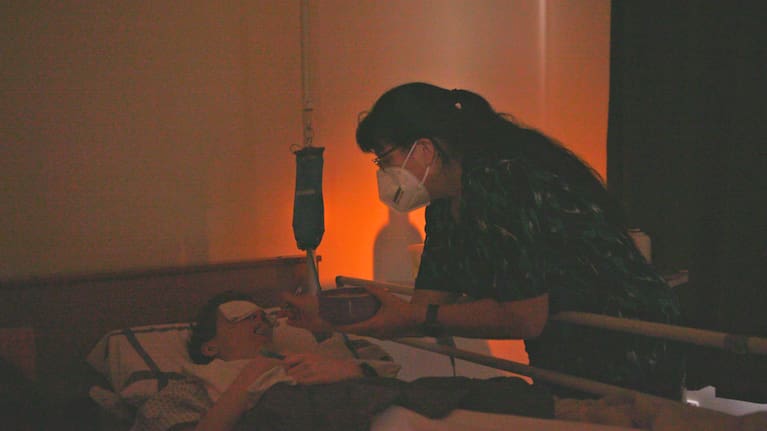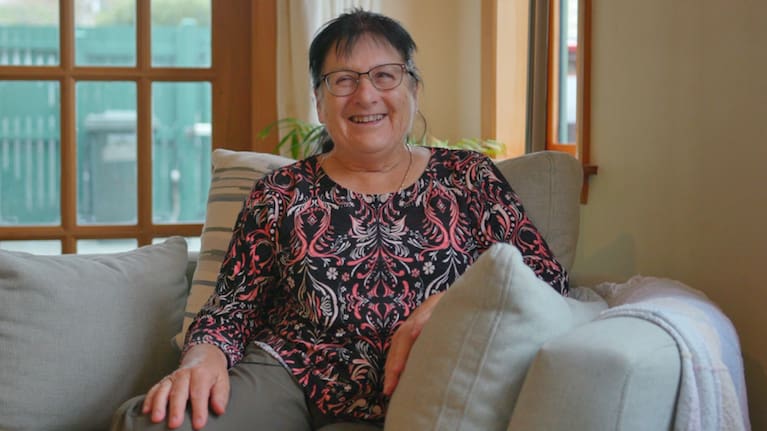ME/Chronic fatigue syndrome is a physical disease but misinformation from decades ago claiming it was psychological has resulted in stigma that still impacts the care of patients today. Zoe Madden-Smith looks into the controversy around the mysterious illness for Re: Investigates. Watch it now on TVNZ+.
On a good day, Tammy Rumsey can say a short sentence and have her face washed by her mum. On a bad day, she is too weak to turn her head on her pillow.
The 23-year-old hasn’t been able to leave her bed in a year. She lies in complete darkness and silence with an eye mask and earplugs on. Any light, sound or touch could cause her intense pain.
“This illness has robbed my daughter of her life,” says her mum Glenys Rumsey, who has been her fulltime carer for five years.
“When she’s bad, she doesn’t have the energy to chew, she doesn’t have the energy to swallow.”
The illness without a cure
Myalgic Encephalomyelitis (ME), also known as Chronic Fatigue Syndrome, is a complex neurological disease that can impact everything from the brain, muscles and heart to the immune, nervous and digestive system.
For some, it can look like difficulty thinking and fatigue that doesn’t go away with rest. But in severe cases like Tammy’s, the illness can stop you from being able to move, eat or even speak.
There is no cure and even the exact cause is unknown – but it is often triggered by an attack of the immune system, usually by a virus.
Women are also four times more likely to have it than men. And for many it is a life-long illness. With 10-25% of people with ME becoming housebound or bedbound.
Associated NZ Myalgic Encephalomyelitis Society Inc (ANZMES), estimates 65,000 New Zealanders have the disease – with Long Covid driving ME rates 15 times higher than before the pandemic. Those who have Long Covid are eight times more likely to develop ME/CFS.
But despite it being a physical and extremely debilitating disease, misinformation from decades ago that claimed it was psychological and due to “hysteria” because more women were affected has resulted in stigma that still persists today.
‘An impossible situation’
Before having ME/CFS, Tammy was always on the go. She was a surf life saver, a theatre kid and “was living life to the max,” her mum says.

But Tammy got glandular fever when she was 15. At first, she recovered, but in 2020 at university, she noticed she would have memory lapses and started getting so tired she couldn’t move.
“She would drop to the ground and freeze or become, like, paralysed for a short period of time,” Glenys says.
“Her friends had been taking her to the emergency department, and while she was waiting and lying on the gurney, she would slowly start to be able to move again so the doctor would say things like, ‘Have you got boyfriend problems?”
Tammy quit her part-time job and took breaks between semesters. But the illness only got worse and, within a few months, she couldn’t sit in a chair. Since June 2024, she hasn’t been able to get out of bed.
As Glenys, a retired nurse, took on the role of caring for her daughter fulltime, she noticed the stark lack of understanding and support for ME/CFS patients – made worse by a health system at breaking point.
Living an hour out of Wellington at the time, Glenys struggled to find a GP who could do home visits and Tammy was too unwell to get out of bed. She tried to get hospice to visit but they didn’t have the capacity either. So, with no other option, Tammy was admitted to hospital where she stayed for three months.

“I didn’t want Tammy to end up in hospital-level care or in a rest home for years on end,” Glenys says. “She’s 23 years old, that’s just not what I want for my daughter. And I really want to care for her, whatever it takes.”
While Tammy was in hospital, Glenys started texting other women with severe ME in the same hospital.
She realised they were all entitled to three hours of funded care a day. So Glenys worked out if she pooled together the hours from other patients, she could hire six support workers and create a shared care home in her house.
Glenys is completely unpaid and she and her partner, Dave, have paid out of their own pocket to have their house renovated for people with severe ME.
“We got the thickest carpet underlay we could afford, acoustic panelling in the rooms to absorb sound, black out curtains,” Glenys says.
“This is a win-win situation for everybody,” she says. “I can’t see a downside of this. The hospital will have its rooms back. The girls who had nowhere to go, now have a home.”
Watch Re: News’ investigation now on TVNZ+.
Support networks for ME/CFS:
Associated New Zealand ME Society (ANZMES) provides support and distributes information to groups and individuals suffering from or interested in ME/CFS including their families and carers.
ME RESPITE is a registered charity providing practical support to those with Myalgic Encephalomyelitis (ME) Chronic Fatigue Syndrome (CFS) and related illnesses.












